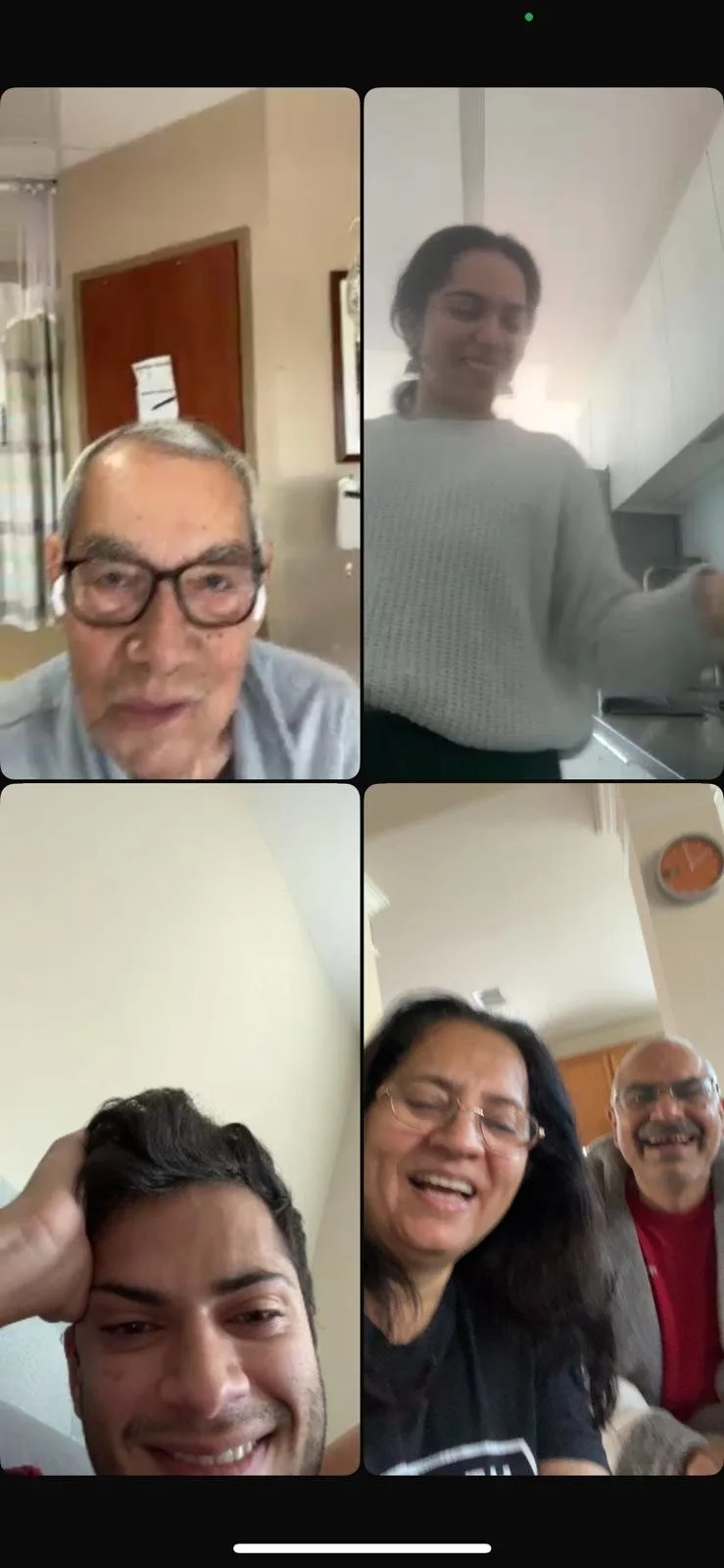Day 2 and 3
Daddy is went through two more days of Chemo. If I haven’t mentioned before, it is a combination of two drugs, Venclexta & Azicitidine, given orally and through an injection. The dosages are mild and therefore he may not experience some of the tougher side effects, which is true so far. He is however expected to feel increasingly tired. He is already feeling a little tired. He has to get up almost every hour on the hour to either go to the bathroom or for Vitals, Blood Draw, Medications etc. therefore he doesn’t get a full night of sleep. This is also making him additionally more tired. However he continues to be in good spirits.
He spent a busy Saturday morning watching, with sadness, Arsenal tie with Everton. He caught up with many, Ruma, Vijay, Gaurav and Garima, Monica, Poulami, Neel, not to mention the doctors and nurses. Observing that Gaurav looks like Dev Anand and telling that Vijay that he is a “Lambe Daur Ka Godha” … a horse of long distance running. Then he changed it to say “Khacchar”, a mule, i.e. someone who is a trouble maker.
With Ruma, Vijay, Gaurav and Garima
On a call with Monica
We are collecting stories and facts about Kolkata and life in Chandannagore from him. Some I have heard many times from him over the last 30 years and some new. Some though old are still charming and entertaining. Through his memory and lens I get to see a unique life in Kolkata and adjoining areas that I haven’t seen from other documentarians, films makers, intellectuals, authors, academics.
I experience something that is like a comfortable, simple, joyful movie filled with vignettes with no explicit message. These stories are not three act dramas, but like an impressionist painting. Just a snapshot of a moment in time. A series of delightful impressions that Van Gogh would have painted if he was not a depressive and was into Big Band, Hindi Movies, Theater and Sports and prided himself to be a Khacchar.
Here is a vignette about his father’s meals, Monsieur Maurice Beteille, while going to “Gondol Para Jute Mill” which was a jute mill of Gillanders, Arbuthnot & Company a 19th century, colonial managing agency house of mercantile roots. The mill was at the edge of the British and French territory but on the French side of the territory. Each jute mill had their own jetty for motor boats that brought jute from the eastern parts of Bengal (now Bangladesh) to be processed at the plant. During lunch time he would come back home from the Mill in a ferry boat across the Ganga river to his Thakuma’s, i.e. his paternal grand mother, Madame Nora Marie Beteille’s home which was near the bank of the river.
“For lunch he would have two eggs, in various forms, omelette, or poached with bread. There were two types of poach made, Pani Poach and Ghee or .. they did not have dalda then … Poach. He would have a curry with it and rice. In the evening, after work, the ferry would drop him off again at the jetty. He would go directly to my Thakuma’s place. She would have a tall glass of barley ready for him and some Makhom biscuits”. I am guessing this was a type of petit buerre or some buttery shortbread. “These were made by the muslim baker brothers, Jahar, Roko, Tojo and Kalu. They had a floral shape”. For those that are not familiar, “Makhom” is a pronunciation of Makhon (Bangla) or Makkhan (Hindi) in parts of West Bengal, which means butter. “He would change from his summer, cotton suit, complete with a waistcoat and tie and into pants and a shirt. He took his glass of barley and biscuits across the road to his own home. At home, he then would change into a dhoti. By the way, in those days, the Bengali would wear two types of dhoti, Tant and Mill. He wore Mill dhoti. After changing into dhoti, he would sit on the floor on a Madur, a floor mat made from reeds. The balcony would have been washed with water before that to cool it down from the afternoon heat. After changing into dhoti, he sat down and chatted with Didima for a while before going home”. Didima is Daddy’s maternal grandmother, Mrs Shibani Mukherjee. “For dinner he would have baked pie followed by pudding. I was not very fond of those pies. Thakuma made various types of pudding at home, boiled custard, baked custard, caramel custard, chocolate pudding etc.” Note that he is using the common English way of describing desserts as pudding. Another holdover from the British days.

